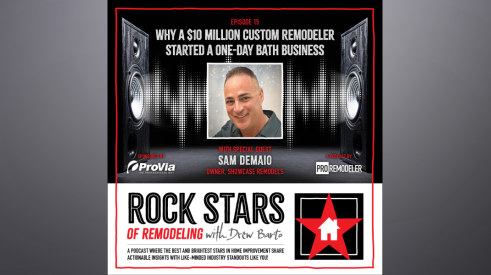There’s a wisecrack that home improvement company owners and sales managers like to make at seminars and similar gatherings. Home improvement selling, they will say—yuck, yuck—is a hard way to make an easy living.
That makes the point that it’s not for the faint of heart. The most successful home improvement salespeople will walk out of the house with a signed contract on maybe one out of every three confirmed appointments (though that varies based on product, lead quality, availability of financing, etc.). The work is daily, the hours (including weekends) extensive, and the most likely statistical outcome of a sales call is rejection.
That the grind of in-home sales is so wearing is what makes a sale such a bell-ringing triumph at many companies. It’s become a cultural cliché, as evidenced by movies such as Tin Men and Glengarry Glenn Ross. On the other hand, those who become skillful at in-home sales can earn large sums. And companies looking to bring young blood into the organization, says Grant Mazmanian, CEO of Pinnacle Group International, should be prepared to not only make that claim, but prove it.
“Money is the No.1 thing,” he says. “We show them how much they’re going to make, and how much the average salesperson in the company makes. And young people today," he adds, “are looking for a guarantee.”
Old-School Stigma
But it’s often tough to get those younger recruits to the point where you can actually show them the money. It takes a certain amount of effort to attract them, owners say, since home improvement companies are often viewed as stodgy, old-fashioned or—the ultimate Millennial pejorative—so 20th century. Ger Ronan, the owner of fast-growing Yankee Home Improvement, in Northampton, Mass., says there’s little choice but to address it directly with young recruits—using humor. But it’s not just sales recruits who may have that idea. The notion that home improvement companies are old-fashioned or fly-by-night is “sometimes people’s perception,” Ronan says, and one that new sales recruits could easily encounter on a call. “A good salesperson will acknowledge [that bias], overcome it, and move beyond it,” he points out. Yankee itself does that by, among other things, posting a 90-second Youtube video in which a first-day employee makes his way around the company’s new 22,000-square-foot building, a symbol of stability.
At the moment, Yankee’s second best salesperson is under 30.
Who You Work For
Just because young people want to see the money doesn’t mean they equate trophy items, such as the Lamborghini sports car and the Rolex watch, with sales success. For Millennials, extravagance is out, down-to-earth is in. Ronan, who lives in “a modest house” and drives a Honda, makes the point that “young people are more interested in who they work for than what they work for.” Selling a high-ticket and not particularly glamorous item such as siding or windows may not have been their first career choice, and may seem like an overwhelming challenge to someone who’s never done it. But if the company’s culture is welcoming and feedback is a constant—a requirement, Mazmanian says—then rising to that challenge is readily imaginable.
“We as business owners have the opportunity to redefine ourselves,” says Brian Gottlieb, owner of Tundraland, a company located outside Green Bay, Wis., selling windows, bathrooms, sunrooms, and walk-in tubs where about 80 percent of its 140 employees are under 35. Tundraland has strengthened its appeal as an employer to those just entering the workforce by offering set-aside performance bonuses, in pre-tax dollars, to future college graduates, which are then used to help pay off their student loans. Another attraction is the company’s reputation as a community-minded employer. Tundraland, for instance, sponsors music festivals, and its website includes a blog of community involvement stories. Gottlieb says he defines his company as “a community-conscious home improvement company.”
Experience vs. Learning Curve
Young people bring energy and tech smarts to a salesforce. But some companies looking to hire in sales prefer a “seasoned” candidate, not only because that person knows how to control the conversation in an in-home consultation to the point where he or she can ask for the business, but also because they are assumed to be capable of conducting themselves in a manner consistent with emotional maturity. Emotional maturity, which Pinnacle International tests for in its recruiting process, consists of loyalty, accountability, perseverance, a willingness to take responsibility, to make a commitment, and “the biggest,” Mazmanian says, “respect for authority.” Emotional maturity, he says, is more critical in sales than anything else. Ongoing analysis of the 30,000 personality profiles in its 30-year database, he says, shows that job applicants tended to reach emotional maturity in the '80s at age 24; today, they reach it later, at 30. As an example, Mazmanian says, someone lacking emotional maturity would “relate to the boss as a peer, and it drives managers crazy. It can also be a major turn-off in the home.”
That may explain why sales managers at some companies prefer experienced salespeople. For instance, at Brothers Services, in Baltimore, director of sales for exteriors, Bert Lebhar, says that his preferred candidate—he’s training four right now—is someone with two years of outside sales experience, “and I don’t care if they are 25 or 60,” he says. The advantage that someone under 35 might have, he says, is that the demographic for exterior jobs—such as roof replacement—is typically younger than it would be for design/build jobs, which the company also specializes in, because the project is based on need, and people like to buy from people who are like themselves.
Many companies require, or at least want to see, some previous outside sales experience. “It’s hard to go from fast food or selling clothes to selling a siding job,” says Dan Merrifield, vice president of sales and co-owner of Lake Side Exteriors, in St. Louis, where the specialty is fiber-cement siding. The backlog has never been greater, and the company is currently looking to hire salespeople. Someone with no experience in construction “can have working technical knowledge in 30 days,” he says—advances in technology have made that possible. But the emotional maturity has to be there. Not everyone who applies for a sales job has the willingness to take this on and become an expert, Merrifield points out. And it’s expertise that convinces Lake Side’s customer demographic, averaging in their 50s.
“A lot of this is how you conduct yourself, regardless of age,” he says. “If homeowners see you as an expert, then you have their respect.”
Hold the Tattoos?
Jake Jacobson, vice president of Premier Window & Building, headquartered in Baltimore, says that the stigma home improvement companies once contended with is fading not only because of time but because more and more of the sales reps that companies hire are young college graduates. Part of their attraction to home improvement employers, he says, is that they’re tech savvy and having them on staff helps companies modernize. “You’ll see people coming down the street with polo shirts that say Window World or XYZ Solar,” he says. “A lot of companies have gone that route.”
Jacobson says he would like to hire more young sales candidates at Premier, but one place where he draws the line is tattoos. His definition has gradually evolved to mean no visible tattoos. Elsewhere, the tattoo taboo is crumbling. “Facial tattoos would be a no-go,” Ronan says. “But I might be the last person at this company right now without a tattoo.”
Add new comment
Related Stories
Home Improvement Success: Luck, Hard Work, or Who You Know?
Even the most brilliant marketing mind could see fewer opportunities due to lack of networking
Homeowner Trends When Selecting Manufactured Stone
On this episode of Rock Stars of Remodeling, ProVia Product Manager of Stone & Roofing Chance Shalosky joins host Drew Barto to reveal design and color trends that contractors should consider when selling manufactured stone in 2024
Why A Successful Custom Remodeler Started a One-Day Bath Business
On this episode of Rock Stars of Remodeling, Showcase Remodels Owner Sam DeMaio shares why he decided to add a one-day bath business and offers tips on how contractors can accumulate wealth
Learn from the Best in Home Improvement and Remodeling
This year’s Pinnacle Experience aims to help remodelers stay ahead of their competitors by featuring captivating keynote speakers and subject matter experts, collaborative roundtable discussions, and networking with proven players from across the country.
Get the Most Out of Your Teams with This Leadership Style
The transformational leadership style focuses on inspiring and motivating team members to achieve their full potential and exceed their expectations
3 Reasons Contractors Should Set Same-Day Sales Appointments
Director of Home Improvement Drew Barto writes that contractors that aren't implementing same-day sales appointments are missing out on opportunities to close more business
Registration Open for The Pinnacle Experience 2024
Register today for The Pinnacle Experience 2024 in Baltimore from June 26-28. Join the best and brightest in home improvement and remodeling for insight, advice, and relationship-building that will help you take your business to new heights.
How Contractors Can Determine Lead Value
On this episode of Rock Stars of Remodeling, Builder Prime Founder and CEO Jonathan Weinberg reveals how contractors can effectively determine the value of each lead to their business, and why they must do so
24 Marketing Tips for Home Improvement Contractors in 2024
Quick-hitting advice on how contractors can increase and enhance lead flow in 2024
Rising Financing Fees to Impact Home Improvement Industry
NEWPRO Home Solutions COO shares his expert insight on the challenges facing the home improvement industry in 2024 for Pro Remodeler's Thought Leader predictions series












